Summer season is officially here. It is a great time to enjoy cookouts, playing sports, or participating in water-related activities. The summer season also brings a number of things that we need to be mindful of in order to be safe, such as hurricane season, mosquito season, and the less known amoeba season.
Naegleria fowleri is a big name for a tiny amoeba. This parasite is most often found in warm bodies of fresh water such as lakes, rivers, ponds, and canals. It can cause a rare infection of the brain called primary amebic meningoencephalitits (PAM) that destroys brain tissue and is usually fatal.
Infections occur when contaminated water enters the body through the nose. Once the amoeba enters the nose, it travels to the brain where it causes PAM. Infections usually occur during our warmest weather months of July, August, and September. During these months the water temperature is higher and the water levels are lower, creating a peak season for amoebas.
Symptoms of PAM usually start within one to seven days after infection and may include headache, fever, nausea, or vomiting. Other symptoms can include neck stiffness, confusion, loss of balance, seizures, and hallucinations. After the start of symptoms, the disease progresses rapidly.
In Florida, there have been eight cases of Naegleria fowleri infection since 2003. Last year, in Glades County, there was a case of PAM in a 12-year-old boy, which he acquired while knee-boarding in a drainage ditch. In Polk County, the last case occurred in 2009, when a 10-year-old boy was infected while wake boarding in a lake. Tragically, both young boys died as a result of this terrible disease.
While primary amebic meningoencephalitis is 99 percent lethal, it is 100 percent preventable. There are steps a person can take to reduce their risk of infection:
- Avoid water-related activities in warm freshwater during periods of high water temperature and low water levels
- Limit the amount of water going up your nose by holding your nose shut, using nose clips, or keeping your head above water when taking part in warm freshwater-related activities
- Avoid digging in, or stirring up the sediment while taking part in water-related activities in shallow, warm freshwater areas
Remember, this disease is rare and taking smart preventative steps can allow for a safe and relaxing summer swim.
For more information, please visit the CDC’s website at http://www.cdc.gov/parasites/naegleria/index.html and http://amebaseason.com/
CREDITS
story by DR. ULYEE CHOE, Director of FDOH-Polk
About the Author: Dr. Ulyee Choe, an infectious disease physician, serves the community as director of the Florida Department of Health in Polk County (FDOH-Polk) and as a Polk County Medical Association member. For more information about FDOH-Polk, visit www.mypolkhealth.net.
